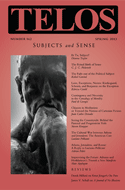This is the third in a series of posts that introduce the thought of historian Martin J. Sklar, as a prelude to a print symposium on his life and work in a future issue of Telos. For a fuller introduction, refer to the head note to the first TELOSscope post. Whereas the first two posts showcased the historian’s engagement with philosophy, this post highlights one of his important contributions to political economy. Sklar profoundly reinterprets the idea of a “mixed economy,” on the basis of the new concepts of “capitalist investment component” (CIC) and “socialist investment component” (SIC). In so doing, he also clarifies the meanings of capitalism and socialism as political-economic systems. Like conventional “mixed economy” theorists, Sklar came to believe that there would be a long historical period during which advanced societies would combine features of capitalism and features of socialism, with the later gaining gradual ascendancy. His understanding of which features belong to which system, however, upends conventional theories of government = socialism, “private” sector = capitalism.
|
Martin J. Sklar, who died in 2014, was a historian, left-wing activist, and original thinker. As a scholar/journalist-activist, he founded Studies on the Left, co-founded Socialist Revolution and In These Times, and was a founding member of The Historical Society. As a historian, he originated the influential concepts of “corporate liberalism” and “disaccumulation” and shaped the thinking of historians of the Progressive Era, the Jefferson–Hamilton divide, Lincoln’s revolutionary role in ending slavery, the sources and consequences of U.S. imperialism—and more. Writing in the Washington Post, George Will discusses Joel Kotkin’s The New Class Conflict (recently published by Telos Press) and the reasons why today’s government serves the wealthy and powerful. Steven Knepper’s “Seeing the Countryside: Behind the Pastoral and Progressivist Veils” appears in Telos 162 (Spring 2013). Read the full version online at the Telos Online website, or purchase a print copy of the issue in our store. |
||||
|
Telos Press Publishing · PO Box 811 · Candor, NY 13743 · Phone: 212-228-6479 Privacy Policy · Data Protection Copyright © 2025 Telos Press Publishing · All Rights Reserved |
||||
 Building upon the work of Raymond Williams, this essay questions the lack of critical scrutiny given to the countryside and its cash crop monocultures. It holds that simple narratives of decline and progress contribute to this strange invisibility. Simple narratives of decline often contrast an idealized countryside and an insidious city, drawing a pastoral veil over the problems and economics of the actual working countryside. Simple narratives of progress often suggest that we have left the countryside behind entirely. When they do acknowledge continuing agricultural realities, they display what Vandana Shiva calls a “monoculture of the mind.” They present contemporary agribusiness as the only way to feed the world, thereby deflecting critical attention. In order to truly see the countryside and its centrality to modernity, this essay suggests we must draw back the pastoral and progressivist veils.
Building upon the work of Raymond Williams, this essay questions the lack of critical scrutiny given to the countryside and its cash crop monocultures. It holds that simple narratives of decline and progress contribute to this strange invisibility. Simple narratives of decline often contrast an idealized countryside and an insidious city, drawing a pastoral veil over the problems and economics of the actual working countryside. Simple narratives of progress often suggest that we have left the countryside behind entirely. When they do acknowledge continuing agricultural realities, they display what Vandana Shiva calls a “monoculture of the mind.” They present contemporary agribusiness as the only way to feed the world, thereby deflecting critical attention. In order to truly see the countryside and its centrality to modernity, this essay suggests we must draw back the pastoral and progressivist veils. 

